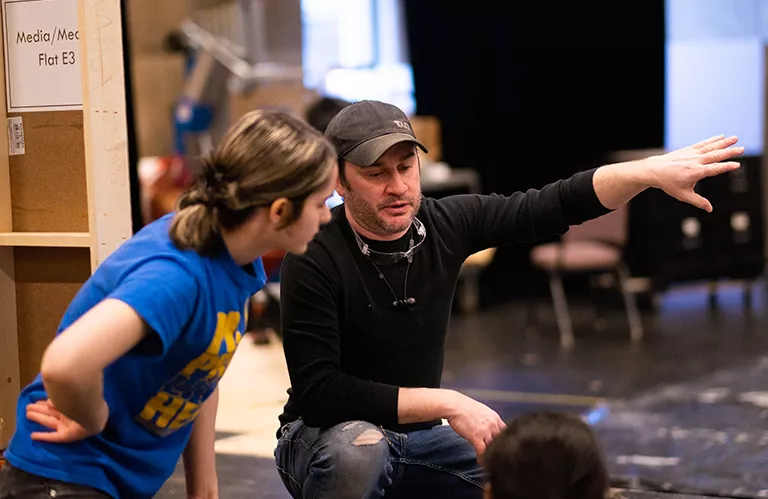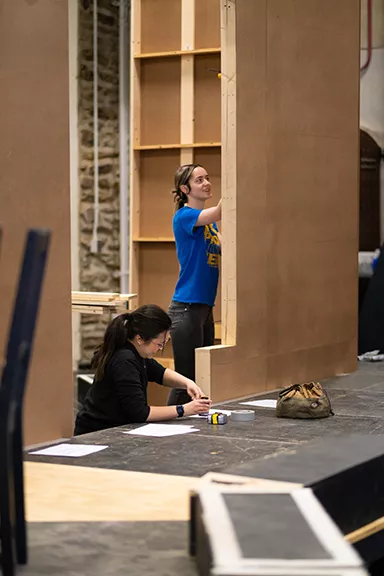
In less than a month, Media/Medea, an updated adaptation of Euripides’ Greek tragedy Medea, re-envisioned for the 21st-century from a Black perspective, will be performed on stages at Bryn Mawr and Community College of Philadelphia (CCP).
Rehearsals have been taking place for several weeks now and the technical and production aspects of staging the play are starting to take shape, with a dedicated student tech crew working on carpentry, lighting, sound engineering, and stage management.
For the students, this is not only a chance to participate in the premiere of a play by Pulitzer-Prize winning playwright James Ijames—of Fat Ham fame—it’s also an opportunity to interact with peers from different educational institutions. Half of the students in the production are from Bryn Mawr and Haverford Colleges and half are from Community College.
The staging of the play, set to open in mid-April, is part of Greek Drama/Black Lives, a yearlong collaboration sponsored by the Theater and Classics Departments at Bryn Mawr and funded by an American Council of Learned Societies grant.
“Participation in the Medea project is the type of high-impact practice that extends the classroom in a real way,” says Brian Seymour, who heads up the Honors program at CCP. “This is a rare opportunity in the humanities, and it is important for students to see academics collaborate toward a shared goal.” The project also aims to pave the way between CCP and Bryn Mawr College for students hoping to transfer.
“One big thing that being involved in theater in any way can teach ... is that kind of critical thinking and problem solving. You start with ‘I don't know how to do this thing,’ but then you figure it out.” — Amy Radbill
The play is being produced by the Theater Program at Bryn Mawr, led by co-PI and Chair of the Arts Catharine Slusar, who brought Ijames to the project as playwright. “Theater, with its ability to share perspectives, is at the core of what it is to be human,” Slusar says. “This project uses theater to draw a line from the classics to the present, challenging us along the way.”
In addition to the play, the Greek Drama/Black Lives project includes a playwriting class, a partnership with middle schoolers at E.M. Stanton School in South Philadelphia, and a theoretical and experiential graduate seminar.
In transposing Medea to a modern setting, Ijames, an associate professor of theatre at Villanova University, looked to popular culture for inspiration, imagining how the implosion of a celebrity couple might affect their children, and in the process lifting up questions of race and familial conflict.
“There’s quite a span of experience and skill levels among the technical theater students,” says Amy Radbill, BMC’s theater production manager. "We're delighted to work with students who have done this work all their lives as well as those who have never done this work before." She notes that as students gain experience and self confidence, the more advanced among them sometimes take on positions as production leads—lead electrician, sound engineer, stage manager, and others—in which they are responsible for organizing their own crews and work time.
“Seeing that process through, from the beginning through to the end of the show,” she says, "really gives them not just the basic technical or managerial skills, but also an understanding of the artistic goals of the designer they're working with and a sense of why you might design something in a particular way for a particular show.”
Radbill and her colleague Justin McDaniel, who is technical director at Goodhart Theater, have been working on the production with their CCP counterpart Newton Buchanan and Jonathan Pappas, who teaches a theater production class at CCP. Early on, Radbill and Buchanan co-taught a lighting workshop at CCP, and the following week McDaniel talked to the students about scenic work and carpentry.
Now, every week, CCP students come out to Bryn Mawr to work alongside the Bi-Co tech crew helping to get the set built and installed. One of the challenges with this production is that the staging of the play will take place in two very different spaces at Bryn and CCP.
Bryn Mawr’s Goodhart Theater is a 20-foot-tall square, while CCP’s Black Box Theater is a rectangle with a height of only about 12 feet tall. Kay Strine, a Bryn Mawr junior and assistant scenic designer for the production, says that they and set designer Maiko Matsushima had to take into account the marked difference in the spaces when designing the set. "Rather than lamenting the lack of space," they say, "it’s taught me to think of it not as a limitation but a unique challenge to work with and around."
Stage manager Anne Meyer '23 says working on the production has exercised all her problem solving skills. "Every week I work with the director to make a call list, which involves a New York Times level logic puzzle of 19 peoples schedules and conflicts," she says. "In rehearsals I am considering how every aspect of the show comes together—light, sound, scene, costumes, and props—and thinking creatively about how each prop can get on and off stage at the right times."
Meyer is also struck by the overlap between her work as a stage manager and her work as a student in the biology department. "I am able to bring a diagnostic and logistic view to a theater space from my STEM background, and in return I approach science with an inquisitive creativeness that one can only learn in theater," she says. "I am thankful that professors in both departments can also see these overlaps and work to support my efforts."
"We run and get train passes, stand-in props, Ibuprofen, and speakers." — Cricket Bradford
Assistant stage manager Cricket Bradford '23 says being in this role they have had to figure out how to juggle many tasks at once. "We run and get train passes, stand-in props, Ibuprofen, and speakers," they say. Their job, they explain, "is to be the line of communication between design and actors, and to wrangle the actors so they’re present and ready to work. Luckily, the cast of Media/Medea has not been too hard to wrangle, as everyone is so fun and hardworking."
To move the production from Bryn Mawr to CCP, the set will be taken down and loaded onto a truck after the last performance closes at Goodhart on April 16. At CCP, lighting and design plots will be pre-installed by Buchanan and his crew. The actors will then run through the show in the new space to get used to the different traffic patterns and backstage area.
Solving practical challenges is par for the course in the world of technical theater, says Radbill. “One big thing that being involved in theater in any way can teach, and certainly in the production end of things, is that kind of critical thinking and problem solving,” she says. “You start with ‘I don't know how to do this thing,’ but then you figure it out.”
Media/Medea on Stage
James Ijames’ Media/Medea will be directed by internationally recognized director and founder of local Philadelphia company Azuka Theatre, Raelle Myrick-Hodges, and will feature Barrymore Award and Haas Award winning actor Akeem Davis working alongside student actors from Bryn Mawr College, Haverford College, and Community College of Philadelphia.
Performances will take place:
April 13–16: Bryn Mawr College, Hepburn Teaching Theater
April 20–22: Black Box Theatre, Community College of Philadelphia
Community College of Philadelphia ticket reservations coming soon!
More on Greek Drama/Black Lives
- An Intergenerational Class Tackles "Antigone"
- Media/Medea: Staging a Modern Greek Tragedy
- Playwriting Class Puts Mythology on Center Stage
- Graduate Seminar Class Brings Ancient Texts to Life
- Pulitzer-Winning Playwright Visits Campus to Discuss 'Medea' Collaboration
- "Media/Medea" Theater Program Page
- Faculty Members Catherine Conybeare and Catharine Slusar Receive ACLS Grant
